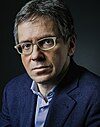


Reddit meter
Connectography: Mapping the Future of Global Civilization
496 pages, 2016
In Connectography , Parag Khanna argues that new energy discoveries and technologies have eliminated the need for resource wars; ambitious transport corridors and power grids are unscrambling Africa's fraught colonial borders; even the Arab world is evolving into a more peaceful map as it builds resource and trade routes across its war-torn landscape.
At the same time, thriving hubs such as Singapore and Dubai are injecting dynamism into young and heavily populated regions; cyber-communities empower commerce across vast distances; and investments into building an inclusive global society are being wisely made. Beneath all this chaos is a new foundation of connectivity pulling us together.
In Connectography, Parag Khanna explores the idea that connectivity, not geography, is the driving force behind global development. He suggests that we should look at the world as a network of cities and supply chains, rather than a map of borders and territories. This could change the way you see the world and its future.
Khanna digs into the rise of megacities and how they are becoming the new power centers. He argues that these megacities, connected by infrastructure and technology, are more important than nations. This might make you rethink the importance of your own city and its role in the global network.
The author emphasizes the importance of infrastructure in shaping the future of global civilization. He believes that infrastructure is the backbone of connectivity and thus, the key to economic growth and stability. This could inspire you to research more about the infrastructure in your own city or country.
Khanna takes a look at the future of nations in a connected world. He suggests that nations will become less relevant as cities and corporations gain more power. This could challenge your understanding of national identity and sovereignty.
In Connectography, Khanna explores the role of technology in shaping our connected future. He sees technology as a tool that can bridge gaps, break down barriers, and foster global cooperation. This might encourage you to see technology not just as a gadget or an app, but as a powerful force that can shape the future of our civilization.
Quotes 2
Connectography is a compelling vision of the future and it's arriving faster than we think. Parag Khanna's vision is creative and full of insight.
 Ian Bremmer - Political Scientist
Ian Bremmer - Political ScientistParag Khanna's Connectography is a bold reframing of global geography. It provides a powerful blueprint for how to connect the world.
 Dominic Barton - Global Managing Partner
Dominic Barton - Global Managing Partner






